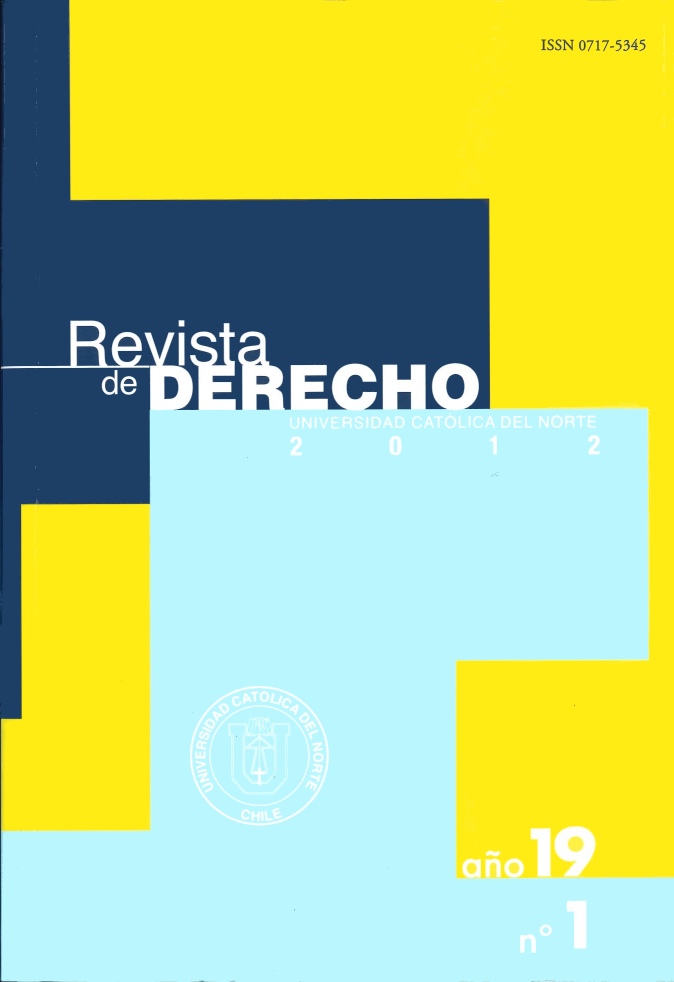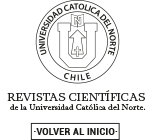La complementariedad de la Corte Penal Internacional según el Tribunal Constitucional chileno
Palabras clave:
Tribunal Constitucional, Estatuto de Roma, Corte Penal Internacional, Jurisdicción, ComplementariedadResumen
Una sentencia del Tribunal Constitucional de 2002 declaró que la aprobación y posterior ratificación del Estatuto de Roma requería una reforma constitucional previa. Entre los motivos señalados, la sentencia destacó el supuesto carácter correctivo y sustitutivo de la jurisdicción de la Corte Penal Internacional, respecto de la competencia de los tribunales nacionales. La introducción de una nueva disposición transitoria en nuestra carta fundamental facultó el 2009 al Estado chileno para reconocer la jurisdicción de la Corte. Esta nueva disposición calificó su competencia de subsidiaria, según lo señalado en el tratado que instituye dicha Corte. Gracias a esta disposición, una sentencia del Tribunal Constitucional del mismo año declaró que el Estatuto de Roma no contiene normas que se opongan a la Constitución Política de la República de Chile. Pero ¿en qué momento pasó la jurisdicción de la Corte Penal Internacional, de correctiva y sustitutiva a complementaria y subsidiaria? El presente artículo busca responder esta pregunta.
Citas
BANTEKAS, Ilias, y NASH, Susan (2007). International Criminal Law. Nueva York, EE.UU.: Routledge-Cavendish, 594 pp.
BENZING, Markus (2003). "The Complementarity Regime of the International Criminal Court: International Criminal Justice between State Sovereignty and the Fight Against Impunity". Max Planck Yearbook of United Nations Law, Vol. 7, pp. 591-632.
BROWN, Bartram (1999). "U.S. Objections to the Statute of the International Criminal Court: A Brief Response". New York University Journal of International Law and Politics, Vol. 31, pp. 855-91.
CASSESE, Antonio (2008). International Criminal Law. Nueva York, EE.UU.: Oxford University Press, 455 pp.
CASSESE, Antonio (2006). "International Criminal Law". En Evans, Malcolm (editor): International Law. Nueva York, EE.UU.: Oxford University Press, pp. 719-52.
CASSESE, Antonio (1999). "The Statute of the International Criminal Court: Some Preliminary Reflections". European Journal of International Law, Vol. 10 N°1, pp. 144-71.
CEA EGAÑA, José Luis (1999). "Mérito constitucional del tratado que establece la Corte Penal Internacional". Ius et Praxis, Vol. 5 N° 2, pp. 353-61.
CRAWFORD, James (2006). "The Drafting of the Rome Statute". En SANDS, Philippe (editor): From Nuremberg to The Hague: The Future of International Criminal Justice. Cambridge, Reino Unido: Cambridge University Press, pp. 109-56.
DOLZER, Rudolph, y SCHREUER, Christoph (2008). Principies of International Investment Law. Nueva York, EE.UU.: Oxford University Press, 432 pp.
FERMANDOIS VOHRINGER, Arturo (2003). "El Tribunal Penal Internacional y sus implicancias constitucionales". Revista Chilena de Derecho, Vol. 30 N° 3, pp. 471-89.
LIROLA DELGADO, Isabel, y MARTÍN MARTÍNEZ, Magdalena (2001). La Corte Penal Internacional: justicia versus impunidad. Barcelona, España: Editorial Ariel, 307 pp.
MALARINO, Ezequiel (2006). "Evaluación comparativa. Implementación y dificultades de implementación del Estatuto de Roma a la luz de la experiencia latinoamericana". En AMBOS, Kai, MALARINO, Ezequiel, y WOISCHNIK, Jan (editores,): Dificultades jurídicas y políticas para la ratificación o implementación del Estatuto de Roma de la Corte Penal Internacional. Montevideo, Uruguay: Konrad Adenauer Stiftung, pp. 489-512.
NOGUEIRA ALCALÁ, Humberto (1999). "Consideraciones sobre constitucionalidad del Estatuto de Roma del Tribunal Penal Internacional". Ius et Praxis, Vol. 5 N° 2, pp. 363-87.
NOGUEIRA ALCALÁ, Humberto (2002). "Consideraciones sobre el fallo del Tribunal Constitucional respecto del Tratado de Roma que establece la Corte Penal Internacional". Ius et Praxis, Vol. 8 N°1, pp. 563-81.
OTENHOFF, Reynald (2006). "La justicia penal international en el tercer milenio: surgimiento de la Corte Penal Internacional". Eguzkilore ? Cuaderno del Instituto Vasco de Criminologia, N°. 20, pp. 75-82.
OVERY, Richard (2006). "The Nuremberg Trials: International Law in the Making". En SANDS, Philippe (editor): From Nuremberg to The Hague: The Future of International Criminal Justice. Cambridge, Reino Unido: Cambridge University Press, pp. 1-29.
PHILIPP, Christiane (2003). "The International Criminal Court - A Brief Introduction". Max Planck Yearbook of United Nations Law, Vol. 7, pp. 331-9.
ROJAS OLIVARES, Andrea, y JIMÉNEZ SALAS, Guillermo (editores) (2006). Doctrina constitucional del Presidente Ricardo Lagos Escobar (2000-2006). Santiago: LOM, Vol. 1, 424 pp.
ROLING, Bert, y CASSESE Antonio (1994). The Tokyo Trial and Beyond: Reflections of a Peacemonger. Cambridge, EE.UU.: Polity Press, 143 pp.
SANDS, Philippe (2005). Lawless World: America and the Making and Breaking of Global Rules. Londres, Reino Unido: Allen Lane / Penguin, 324 pp.
SAROOSHI, Danesh (1999). "The Statute of the International Criminal Court". International & Comparative Law Quarterly, Vol. 48 N°2, pp. 387-404.
TRONCOSO REPETTO, Claudio (2000). "La Corte Penal Internacional y el principio de complementariedad". Ius et Praxis, Vol. 6 N°2, pp. 407-17.
VAN DER WILT, Harmen (2005). "Bilateral Agreements between the United States and State Parties to the Rome Statute: Are They Compatible with the Object and Purpose of the Statute?" Leiden Journal of International Law, Vol. 10 N°1, pp. 93-111.
WAGNER, Markus (2003). "The ICC and its Jurisdiction - Myths, Misperceptions and Realities". Max Planck Yearbook of United Nations Law, Vol. 7, pp. 409-512.
ZIMMERMANN, Andreas (1998). "The Creation of a Permanent Criminal Court". Max Planck Yearbook of United Nations Law, Vol. 2, pp. 169-237.
ZWANENBURG, Marten (1999). "The Statute for an International Criminal Court and the United States: Peacekeepers under Fire?" European Journal of International Law, Vol. 10 N°1, pp. 124-43.
Publicado
Cómo citar
Número
Sección
Aquellos autores/as que tengan publicaciones con esta revista, aceptan los términos siguientes:
- Los autores/as conservarán sus derechos de autor y garantizarán a la revista el derecho de primera publicación de su obra, el cuál estará simultáneamente sujeto a la Licencia de reconocimiento de Creative Commons que permite a terceros compartir la obra siempre que se indique su autor y su primera publicación esta revista.
- Los autores/as podrán adoptar otros acuerdos de licencia no exclusiva de distribución de la versión de la obra publicada (p. ej.: depositarla en un archivo telemático institucional o publicarla en un volumen monográfico) siempre que se indique la publicación inicial en esta revista.
- Se permite y recomienda a los autores/as difundir su obra a través de Internet (p. ej.: en archivos telemáticos institucionales o en su página web) antes y durante el proceso de envío, lo cual puede producir intercambios interesantes y aumentar las citas de la obra publicada. (Véase El efecto del acceso abierto)





_(1).png)











